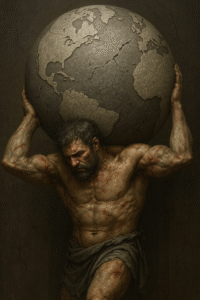The Truth Behind the Trend
You’ve probably seen it—another viral post saying that exercise heals trauma, or even that it can make you forget your past.
I get the sentiment. I train too.
But here’s the truth:
Trauma doesn’t just disappear after a good lift.
You don’t forget.
You adapt.
Just like Atlas holding the world on his shoulders, some of us carry things that feel just as heavy.
Except this world isn’t made of stone—it’s made of memories, scars, and survival.

The world is heavy. That doesn’t mean you don’t have the strength to carry it.
What Science Actually Says
Despite the oversimplified posts online, real research does support exercise as a tool in trauma recovery. But not in the way people think.
1. Exercise helps rewire the brain
Physical activity increases BDNF (Brain-Derived Neurotrophic Factor), a key chemical for neuroplasticity.
This allows the brain to build new connections—essential for people recovering from PTSD or prolonged stress.
⚖️ 2. Reduces cortisol and emotional reactivity
Regular training helps regulate your stress hormones, lowers baseline anxiety, and improves mood.
You’re not cured—but you’re calmer, more in control, and less reactive.
3. Rebuilds body awareness
Trauma disconnects people from their own bodies.
Through strength training, running, or even stretching, many find their way back to feeling grounded.
This is central to somatic therapy, which uses body-based approaches to release what talk therapy can’t reach.
4. Supports memory reconsolidation
When exercise is paired with reflection or therapy, it helps “soften” the emotional grip of traumatic memories.
You remember—but it hurts less.
You move forward, even if the past is still in the rearview.
My Take
I’ve trained through moments that broke me mentally long before my body ever gave out.
I’ve used the gym as both therapy and armor.
Some days, the weight feels symbolic—like I’m literally lifting the past off my back.
Other days, the workout is just a break from overthinking, a chance to feel like me again.
I don’t train to forget.
I train to prove I’m still here.
Still fighting. Still strong. Still standing.
The Atlas Within
Atlas didn’t ask for the burden—but he bore it anyway.
He didn’t collapse. He carried.
We’re the same.
No one hands you trauma. It shows up and stays whether you’re ready or not.
But over time, something changes:
You stop shrinking under the weight.
And you start rising into it.
Your frame gets stronger.
Your mind steadier.
You stop hoping to “let go” of the past, and start learning to live above it.
Final Thoughts
You won’t forget.
But maybe that’s not the point.
The point is that it no longer owns you.
Because every time you train—every time you fight for discipline, for peace, for control—you’re proving one thing:
You carry the world now.
And it doesn’t carry you.
